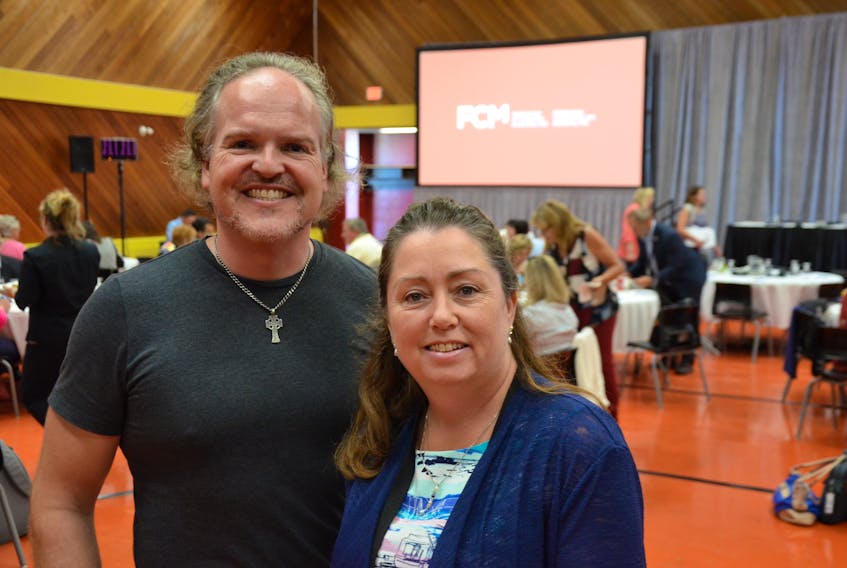CORNWALLIS PARK, NS - Last week the non-partisan organization that makes sure Ottawa hears the concerns of the smallest Canadian communities and the country’s largest cities did something it had never done before. It held a board meeting in a rural community.
Annapolis County hosted about 100 Federation of Canadian Municipalities board members for a three-day meeting that looked at numerous issues from socio-economic development and infrastructure deficiencies, to homelessness.
Annapolis County Warden Timothy Habinski, who hosted the three-day meeting at the Annapolis Basin Conference Centre, is serving for a second year on the FCM board.
“The Federation of Canadian Municipalities is the advocacy group that represents the interests of all municipalities – that’s cities, town, villages, and rural municipalities – in negotiations with the federal government,” Habinski said during a lunch break at Champlain Hall Sept. 13. “The FCM has proven to be an extremely effective advocate over the years. The gas tax (rebate) which most municipalities rely upon for a good portion of their infrastructure funding was something the FCM negotiated with the federal government many years ago.”
He said that similarly the national housing strategy that was proposed last fall was developed in direct partnership with FCM.
“So FCM managed to have a voice, a non-partisan voice, in federal politics that has a really significant impact on the supports and programs and policies that are put in place to help municipalities,” he said.

Rural Communities
“One of the things that is really exciting for us is FCM, especially over the last three years, has started to really take an increased focus on small communities – the smaller and rural communities,” Habinski said. “I’ve been involved in that process and part of the reason we have them here this week – this is the first time FCM has had a board meeting in a small rural community like this.”
He said normally the FCM meetings are held closer to airports.
“But we believe it was really important for these leaders from across the country to see a small community like Annapolis County very, very clearly, where it is,” he said. “We invited our municipal neighbours to come in and actually be in attendance because we wanted them to recognize that in a rural municipality you’re never alone. Every decision you make has implications to your neighbours and vice-versa, and even when you’re in periods of friction with your neighbours you always have to keep it in mind.”
He said in an interview it’s been a very effective board meeting and that the area was shown to good advantage.
Vicki-May Hamm is the FCM president and mayor of Magog, a town of just over 25,000 in southeastern Quebec.
“It’s worked out well,” she said of the decision to meet in Cornwallis. “It was important for our rural members to experience having a meeting like this in rural Canada. It’s been going really well.”
Poverty Reduction
“This morning I was co-chairing a committee meeting on socio-economic development,” said Habinski. “So we were discussing specifically issues of homelessness, poverty reduction strategy, and how we play into the recently announced federal policy on poverty reduction. In many respects we think it gives municipalities exactly what they’ve been looking for, but we’re wanting to refine that focus to insure that the sorts of aid the federal government produces will play out to equal benefit in communities of different size and with different resources. So that was one of the focuses this morning.”
He said FCM has standing committees on socio-economic development, climate change, and even programs in other countries where they try to support the development of democratic institutions.
“And of course one of biggest focuses right now, as an organization, is Election 2019,” Habinski said. “So this is an opportunity for municipalities, in a very non-partisan way, across the country to put together the list of the things that they need in order to help their citizens live fulfilled lives.”
He said that list becomes a platform that FCM presents to each of the federal parties for their comments and to let them know FCM’s priorities, “and that this is where we would like to encourage them to move.”
“This is a really important meeting because we’re talking about our strategic plan,” Hamm said. “We’re talking about governance and we’re talking about the next election in 2019 – how to make sure the priorities of our municipalities are on the agendas of all political parties.”
Hamm said it’s important the concerns of communities of all sizes are head.
“On the agenda, for example, for 2019 we will be talking about broadband because rural Canada has not been well served in broadband,” she said. “And we will be talking about issues that may concern bigger cities also.”
Ideas Exchange
While the three-day FCM board meeting had a tight schedule, with members working through meals a clocking 10-hour days, Habinski said they’re all passionate about what they do and even after the day’s work is done, they tend to talk and exchange ideas.
“These are some of the most eager people to work on municipal issues and to help their communities that you’ll find in the country,” Habinski said. “They’re passionate. They wind up exchanging notes, exchanging ideas, trading best practices, collaborating to develop new best practices, and you’d never have an opportunity for a councillor from the Yellowknife to be providing direct advise to a councillor from Cape Breton in a meaningful way if it wasn’t for an organization like this.”
“The discussions in the corridors are just as important as the official meeting,” Hamm said.
Some people drove to Cornwallis Park – from as far away as Manitoba – because they wanted to spend extra time in Nova Scotia, Habinski said.
Hamm has done that herself in the past.
“It is fun to be able to take some extra time, meet with the people,” she said. “We’re always work, work, work.”
“It’s been a fantastic opportunity for Annapolis County to showcase itself to the country in this fashion,” said Habinski. “We have a beautiful, beautiful municipality that has unique strengths and unique challenges facing it, and we’ve had an opportunity to explore some of those things with the rest of the board, and we hope it will have an impact on policy direction.”









